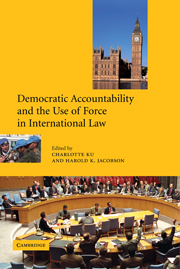Book contents
- Frontmatter
- Contents
- List of figures
- List of tables
- Notes on contributors
- Preface
- List of abbreviations
- I Introduction
- II The domestic and international context
- III Traditional contributors to international military operations
- 6 Canada: committed contributor of ideas and forces, but with growing doubts and problems
- 7 Norway: political consensus and the problem of accountability
- 8 India: democratic, poor, internationalist
- IV Newcomers to international military operations
- V Permanent members of the UN Security Council
- VI Conclusion
- Appendix A. Uses of military forces under the auspices of the UN and NATO
- Appendix B. Country participation in international operations, 1945–2000
- References
- Index
7 - Norway: political consensus and the problem of accountability
Published online by Cambridge University Press: 30 July 2009
- Frontmatter
- Contents
- List of figures
- List of tables
- Notes on contributors
- Preface
- List of abbreviations
- I Introduction
- II The domestic and international context
- III Traditional contributors to international military operations
- 6 Canada: committed contributor of ideas and forces, but with growing doubts and problems
- 7 Norway: political consensus and the problem of accountability
- 8 India: democratic, poor, internationalist
- IV Newcomers to international military operations
- V Permanent members of the UN Security Council
- VI Conclusion
- Appendix A. Uses of military forces under the auspices of the UN and NATO
- Appendix B. Country participation in international operations, 1945–2000
- References
- Index
Summary
When Norway's first minister of foreign affairs, Jørgen Løvland, in 1905 delivered Norway's first official statement on foreign policy, he famously stated that “our foreign policy is to have none.” The attitude behind this statement has proved durable. Despite Norway's reputation as an advocate of a foreign policy based on humanist values, its foreign policy cannot be understood by reference to authentic values and a specific national culture. Rather, Norwegian foreign policy generally, and decisions to deploy military personnel in international operations specifically, is best understood by analogy to Jean-Jacques Rousseau's concept of the social person, for whom motivations for actions are rooted in a concern with other people's judgments. The result is a constant adaptation to dominant international norms and ideas. Norway, a small country with limited resources, is dependent on converting its role in “low political” issue-areas through involvement in international peace operations to “high political” gains.
Norway has, since the Second World War, ordered its international contacts in two closely connected and mutually coherent arenas: NATO and the UN. From 1949 until the early 1990s, engagement in these two fora was to a large extent justified with reference to an underlying argument in support of an international legal order. Involvement in international military operations has historically been an important expression of a commitment to this order. From a population of 4 million, more than 50,000 Norwegians have taken part in international operations, almost all of them under UN leadership.
- Type
- Chapter
- Information
- Publisher: Cambridge University PressPrint publication year: 2003
- 2
- Cited by

